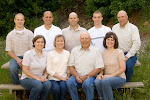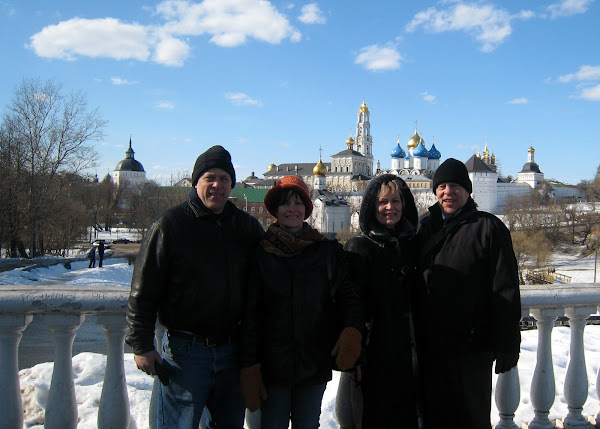When we first came to Moscow, we were doing humanitarian projects with organizations serving the poor and needy. We have enjoyed this service and knowing we can be part of the process of providing the less fortunate with things that will help to make their lives a little better. We still are involved with humanitarian service, but much of our time since the middle of February has been supporting the work from the office in the Service Center for the 16 countries in this area of Eastern Europe. Currently, there are 20 humanitarian couples in the area.
In the office, Sam’s main responsibilities involve receiving requests for humanitarian projects and deciding whether to recommend the project for approval. One of my duties is to process expense reports related to administering the projects and other various reports. We answer e-mails and phone calls dealing with questions and concerns the humanitarian missionaries have and are involved with training new missionaries.
Regulations in Russia limit the type of projects we can do, so most of our projects are what we call Area Initiatives that usually cost between $2000 and $5000. We do some projects locally costing more than $5000, but we can do more projects when we keep the cost at the lower level. The high import duty Russia charges makes it cost prohibitive to bring in containers with wheelchairs, clothing, medical supplies, etc. However, there still is much good that the Church can do by helping with the smaller projects in Russia, such as providing equipment for a hospital, computers for a school for invalids, or kitchen equipment for an orphanage. In contrast, Sam has currently been involved with a project providing clean water for thirteen villages in Armenia (wells, piping, etc.) and with a wheelchair project in Turkey (25 containers). Each container holds 250 wheelchairs.
Before coming to Russia, we had no idea of the scope of the humanitarian work our Church does. We knew about the emergency relief in disaster areas worldwide, but we didn’t realize the millions of dollars donated by very generous people and how much good they do in helping the very poor lift themselves to a better life.
We aren’t learning the Russian language very fast, but we get together once a week with some other senior missionaries trying to learn a few more words and phrases. Occasionally, we meet together with other senior couples on a Saturday and visit historical sights and places of interest in Moscow. We have even been to the circus, the ballet, and the opera.
As of November 1, all foreigners have to leave Russia every 90 days to renew their visas. Even though our visa was originally issued to be good for one year, we had to leave February 13 and go to Tallinn in Estonia and get a three-month visa. In May, we will have to go again.
The 22nd of April we will be flying to Sofia, Bulgaria, for an Area Humanitarian Conference meeting with the other humanitarian missionaries from Eastern Europe. From there we will go to Kazakhstan to help a missionary couple as they are new to humanitarian service.
In the office, Sam’s main responsibilities involve receiving requests for humanitarian projects and deciding whether to recommend the project for approval. One of my duties is to process expense reports related to administering the projects and other various reports. We answer e-mails and phone calls dealing with questions and concerns the humanitarian missionaries have and are involved with training new missionaries.
Regulations in Russia limit the type of projects we can do, so most of our projects are what we call Area Initiatives that usually cost between $2000 and $5000. We do some projects locally costing more than $5000, but we can do more projects when we keep the cost at the lower level. The high import duty Russia charges makes it cost prohibitive to bring in containers with wheelchairs, clothing, medical supplies, etc. However, there still is much good that the Church can do by helping with the smaller projects in Russia, such as providing equipment for a hospital, computers for a school for invalids, or kitchen equipment for an orphanage. In contrast, Sam has currently been involved with a project providing clean water for thirteen villages in Armenia (wells, piping, etc.) and with a wheelchair project in Turkey (25 containers). Each container holds 250 wheelchairs.
Before coming to Russia, we had no idea of the scope of the humanitarian work our Church does. We knew about the emergency relief in disaster areas worldwide, but we didn’t realize the millions of dollars donated by very generous people and how much good they do in helping the very poor lift themselves to a better life.
We aren’t learning the Russian language very fast, but we get together once a week with some other senior missionaries trying to learn a few more words and phrases. Occasionally, we meet together with other senior couples on a Saturday and visit historical sights and places of interest in Moscow. We have even been to the circus, the ballet, and the opera.
As of November 1, all foreigners have to leave Russia every 90 days to renew their visas. Even though our visa was originally issued to be good for one year, we had to leave February 13 and go to Tallinn in Estonia and get a three-month visa. In May, we will have to go again.
The 22nd of April we will be flying to Sofia, Bulgaria, for an Area Humanitarian Conference meeting with the other humanitarian missionaries from Eastern Europe. From there we will go to Kazakhstan to help a missionary couple as they are new to humanitarian service.







